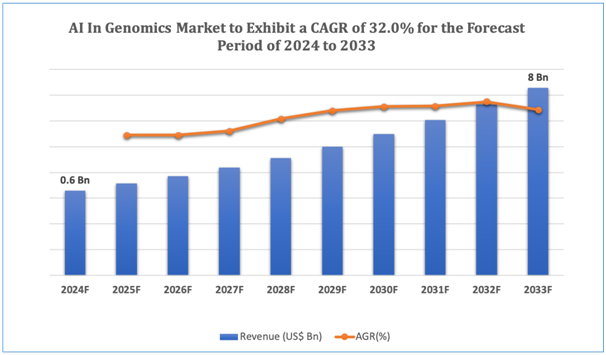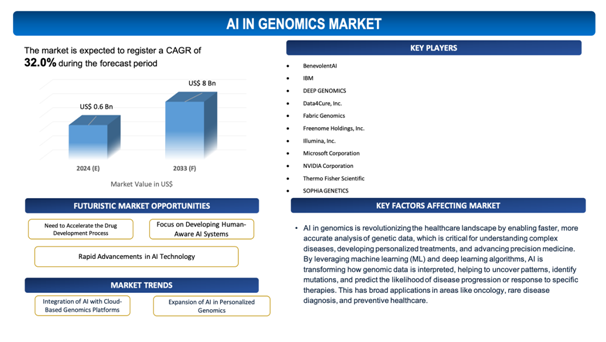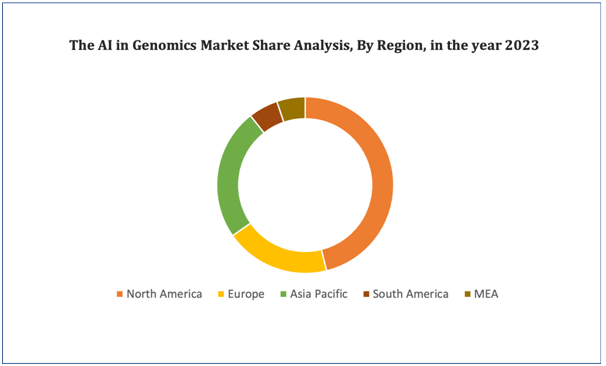AI in GenomicsMarket Overview
The global AI in genomicsmarket is estimated to be worth over USD 8 Bn in 2033 and is expected to grow at CAGR of32.0% during the forecast period (2024-2033).
AI in genomics is revolutionizing the healthcare landscape by enabling faster, more accurate analysis of genetic data, which is critical for understanding complex diseases, developing personalized treatments, and advancing precision medicine. By leveraging machine learning (ML) and deep learning algorithms, AI is transforming how genomic data is interpreted, helping to uncover patterns, identify mutations, and predict the likelihood of disease progression or response to specific therapies. This has broad applications in areas like oncology, rare disease diagnosis, and preventive healthcare.
One of the most profound impacts of AI in genomics is its ability to accelerate the sequencing and analysis of vast amounts of genomic data. Traditional methods of analysing genetic sequences can be time-consuming and require significant manual effort. AI streamlines this process by automating data interpretation, reducing the time from data generation to actionable insights. This is particularly beneficial in clinical settings, where timely diagnosis and treatment decisions are critical.
AI also enhances the development of personalized medicine, where treatments are tailored to an individual's genetic makeup. For instance, AI algorithms can identify genetic mutations associated with certain types of cancer, helping doctors choose the most effective therapies based on a patient’s unique genetic profile. This reduces trial-and-error approaches in treatment, leading to better outcomes and fewer side effects.
In research, AI is driving new discoveries by identifying previously unnoticed genetic markers linked to diseases, providing deeper insights into the human genome. This is especially valuable for studying complex diseases like Alzheimer’s, diabetes, and heart disease, where multiple genes and environmental factors interplay.
Moreover, AI in genomics is contributing to preventive healthcare by predicting an individual's risk of developing certain conditions based on their genetic profile. This enables early interventions and lifestyle modifications, potentially preventing the onset of disease altogether.
Overall, AI is transforming genomics by enhancing the speed, accuracy, and scale at which genomic data is analysed, leading to more personalized and effective healthcare solutions. As the technology continues to advance, its integration into genomics will further unlock the potential of precision medicine and disease prevention.
Figure 1. AI in Genomics: Market Size

Get more details on this report - Request Free Sample
Key Market Insights
The global AI in genomics market is witnessing rapid growth, driven by increasing demand for precision medicine, advancements in AI technologies, and the rising adoption of genomics in clinical and research settings. Key market insights reveal that AI is revolutionizing genomic data analysis, enabling faster and more accurate interpretation of complex genetic information, which is critical for diagnosing diseases, discovering novel drug targets, and personalizing treatments.
Major developments in the market include the integration of machine learning (ML) and deep learning algorithms to automate and enhance the accuracy of genomic data interpretation. These technologies are being employed to identify genetic mutations, predict disease risk, and accelerate drug discovery processes. Companies like Google’s DeepMind and IBM Watson Health are at the forefront, developing AI tools that can analyse massive genomic datasets, providing actionable insights for healthcare providers and researchers.
Additionally, novel technologies such as natural language processing (NLP) and AI-driven bioinformatics platformsare reshaping the market by offering tools that streamline data processing, interpretation, and visualization. These advancements are making genomic analysis more accessible and reducing the time from data generation to clinical application.
The market is also seeing increased collaboration between AI firms, biotechnology companies, and research institutions, fostering innovation and accelerating the adoption of AI-powered genomic tools. As the healthcare industry continues to shift toward personalized medicine, the global AI in genomics market is expected to experience significant growth, with AI playing a central role in transforming how genetic data is leveraged for better healthcare outcomes.
Market Dynamics
Market Drivers
RapidAdvancements in AI Technology & Need to Accelerate the Drug Development Process
Rapid advancements in AI technology, combined with the need to accelerate the drug development process, are significant drivers for the growth of the global AI in genomics market. The conventional drug development process is prominently time-consuming and expensive, often taking over a decade and billions of dollars to bring a new drug to market. AI addresses these challenges by notablyminimizing the time and cost related todetecting promising drug candidates and understanding complex genetic data.
AI technologies such as machine learning (ML) and deep learning algorithms can assesslarge genomic datasets with exceptional speed and precision, determining potential drug targets faster than manual techniques. This capability to swiftly sift through genomic sequences and recognize patterns allows pharmaceutical companies to streamline early-stage research, enhancing efficiency and decision-making in drug discovery. AI-driven bioinformatics tools also predict how specific genetic variations might influence the efficiency of drugs, enabling for more personalized treatment approaches and mitigating the need for extensive clinical trials.
Along with that, the need for precision in targeting genetic mutations responsible for diseases like cancer, Alzheimer's, and rare genetic disorders further fuels the demand for AI in genomics. As AI continues to evolve, its role in accelerating the drug development pipeline becomes progressively essential, helping companies minimize time to market while delivering more effective therapies. This trend is estimated to expand as biopharma companies invest heavily in AI technologies to gain a competitive edge and meet the growing demand for personalized, genomic-based medicines.
Market Restraints
With regard to numerous advantages of AI in Genomics, the market faces several challenges due to the unique characteristics and requirements associated with these potent pharmaceutical products. Some of the key market challenges include:
- High Implementation Costs: The incorporation of AI technologies in genomics requires significant investment in advanced computational infrastructure, specialized software, and skilled personnel. These high upfront costs can limit adoption, particularly for smaller companies and research institutions with budget constraints, acting as a barrier to widespread use of AI in genomics.
- Data Privacy and Security Concerns: Genomic data is highly sensitive, and the use of AI in handling such data raises concerns about privacy and security. The potential for data breaches or misuse of genetic information creates regulatory challenges and may slow down the adoption of AI technologies in genomics, as companies navigate strict compliance requirements.

Get more details on this report - Request Free Sample
Market Opportunity
Focus on Developing Human-Aware AI Systems
The emphasis on developing human-aware AI systems presents a significant market opportunity for the global AI in genomics market. Human-aware AI systems are designed to be more intuitive, ethical, and transparent in their decision-making processes, especially when handling sensitive and complex data, such as genomic information. These AI systems can better understand human behaviour, preferences, and the ethical concerns surrounding the use of personal genetic data, thereby addressing some of the trust issues that currently act as barriers to AI adoption in healthcare and genomics.
By prioritizing ethical AI development, companies can create systems that are more user-friendly and streamlined with regulatory frameworks designed to protect patient privacy and data security. This focus on human-centric AI is crucial in genomics, where genetic data is highly personal, and the potential for misuse can hamper AI integration. Human-aware AI systems can offer better transparency, enabling clinicians and researchers to understand how AI-derived insights are generated, leading to increased trust and wider adoption in clinical settings.
Additionally, human-aware AI systems can enhance collaboration between AI tools and healthcare professionals by providing actionable insights in a more understandable manner, aiding in decision-making for personalized treatments. This opportunity opens up new avenues for AI-driven precision medicine, where genomic insights can be ethically and effectively translated into real-world healthcare solutions, improving patient outcomes while fostering trust in AI technology. This shift is estimated to accelerate the global AI in genomics market as AI becomes more integrated into healthcare workflows.
Market Trends
- Integration of AI with Cloud-Based Genomics Platforms: A soaring trend is the incorporation of AI algorithms with cloud-based genomics platforms, enabling faster, scalable, and more effective processing of large genomic datasets. Cloud technology enables researchers and healthcare providers to access AI tools remotely, supporting global collaboration and reducing the need for costly on-premise infrastructure.
- Expansion of AI in Personalized Genomics: AI is progressively being used to tailor healthcare solutions through personalized genomics. By analysing individual genetic profiles, AI is helping to develop personalized treatments and preventive care strategies, particularly in fields like oncology, rare disease diagnosis, and pharmacogenomics. This trend facilitates the shift toward precision medicine, where treatments are customized based on a person’s genetic makeup.
AI in Genomics Market: Key Segments
By Component
- Hardware
- Software
- Services
By Technology
- Machine Learning
- Deep Learning
- Supervised Learning
- Unsupervised Learning
- Others
- Computer Vision
By Functionality
- Genome Sequencing
- Gene Editing
- Others
By Application
- Drug Discovery & Development
- Precision Medicine
- Diagnostics
- Others
By End-use
- Pharmaceutical and Biotech Companies
- Healthcare Providers
- Research Centers
- Others
By Key Geographical Regions
- North America
- Europe
- Asia-Pacific
- Middle East and Africa
- South America
Figure 4. AI in Genomics Market: Distribution by Region

Get more details on this report - Request Free Sample
AI in Genomics Market: Regional Analysis
In 2022, North America held a majority of the global AI in genomics market share of around 29% in terms of revenue owing to the presence of many market players including Danone; Abbott; Nestlé; Targeted Medical Pharma, Inc.; and Mead Johnson & Company, LLC; among others. North America is home to some of the largest and most well-funded research institutions and biotechnology companies in the world, and these organizations are investing heavily in the development of AI-powered solutions for genomics. This is driving the development of new software and tools for genomic data analysis, and it is contributing to the growth of the AI in genomics market in North America.
Leading AI in Genomics Developers
Industry Trends and Global Forecasts, 2023-2035 report features an extensive study of the current market landscape, market size and future opportunities associated with the AI in Genomicsmarket, during the given forecast period. Further, the market report highlights the efforts of several stakeholders engaged in this rapidly emerging segment of the biopharmaceutical industry. Key takeaways of the AI in Genomicsmarket are briefly discussed below.
The report includes the list of players operating in the global AI in Genomicsmarket. Some of the key players include:
- BenevolentAI
- IBM
- DEEP GENOMICS
- Data4Cure, Inc.
- Fabric Genomics
- Freenome Holdings, Inc.
- Illumina, Inc.
- Microsoft Corporation
- NVIDIA Corporation
- Thermo Fisher Scientific
- SOPHiA GENETICS
AI in Genomics Market: Key Developments
- In June 2023, Illumina Inc.,a global leader in DNA sequencing and array-based technologies, announced the new PrimateAI-3D, an artificial intelligence (AI) algorithm that predicts with unprecedented accuracy disease-causing genetic mutations in patients.
Scope of the Report
The market report presents an in-depth analysis of the various firms / organizations that are engaged in this market, across different segments, as defined in the below table:
|
|
Key Report Attributes |
Details |
||
|
|
Base Year |
2023 |
||
|
|
Forecast Period |
2024-2033 |
||
|
|
CAGR (2024-2033) |
32.0% |
||
|
|
Component |
|
||
|
|
Technology |
|
||
|
|
Functionality |
|
||
|
|
Application |
|
||
|
|
End Use |
|
||
|
|
Key Geographical Regions |
|
||
|
Key Companies Profiled |
|
|
||
